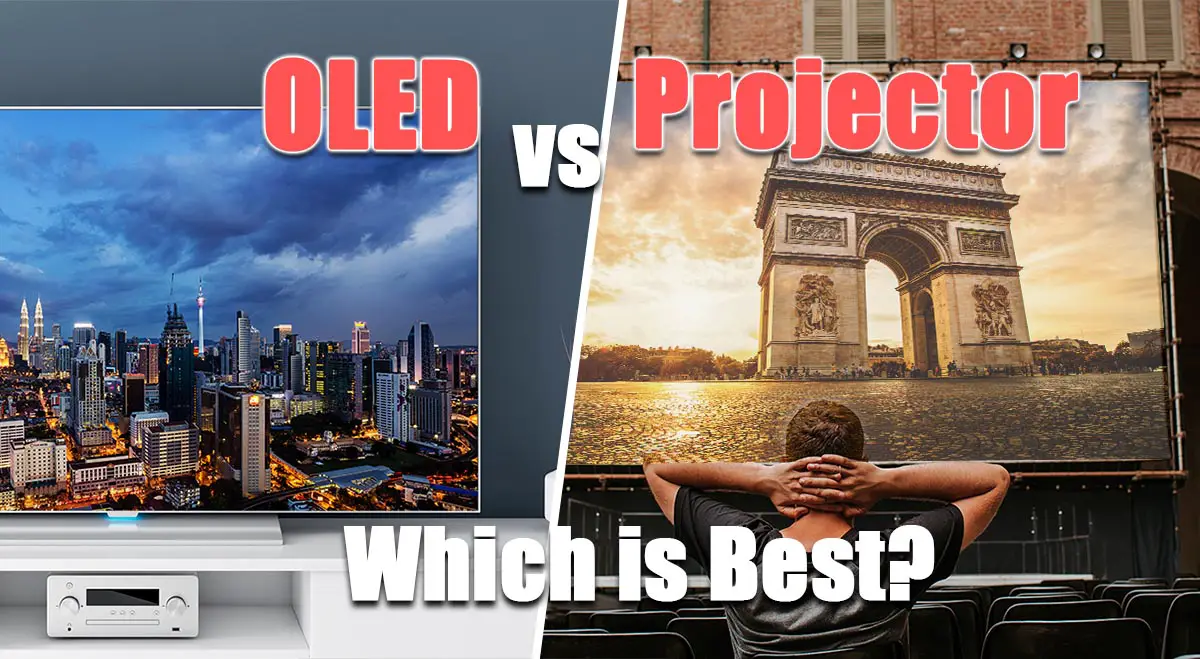OLED (Organic Light Emitting Diode) and Projector are two very popular display technologies used in a variety of different applications. Both have their own advantages and disadvantages that make them better or worse for specific tasks. Here is a quick rundown of the key differences between OLED and Projector displays.
OLED displays are made up of organic materials that emit light when an electric current is applied. This results in incredibly high contrast ratios, as there is no backlight required like there is with LCD screens. OLEDs also offer very wide viewing angles and fast response times, making them ideal for use in mobile devices such as smartphones and tablets where screen size is limited.
However, OLEDs can suffer from image retention and burn-in if static images are displayed for too long, which can be a problem for some users.
Projectors work by shining a light onto a projection screen, which then reflects the image onto the surface. This means that projectors can be used to create large images without the need for a large screen size.
Additionally, projectors can be placed further away from the viewer than other types of display, making them ideal for use in classrooms or conference rooms where space may be limited. However, projectors require a dark environment to work properly, and the image quality can deteriorate if the projector is not positioned correctly.
XGIMI Horizon Pro Review: 4K DLP Projector vs OLED TV!
There are many different types of televisions on the market these days. Two of the most popular options are projectors and OLEDs. So, which is the better option?
Here is a look at the pros and cons of each type of television to help you decide which is right for you.
Projectors
Pros: Projectors offer a much larger screen size than OLEDs.
They can also be cheaper, depending on the model you choose. Additionally, projectors can create a more immersive experience since they fill up your entire field of vision. And finally, many people find that projectors have better image quality than OLEDs.
Cons: The main con of projectors is that they require a dark room to work well. If there is any ambient light in the room, it will wash out the image and make it difficult to see. Additionally, setting up a projector can be more complicated than an OLED TV since you need to mount it and set up a screen (unless you’re using a white wall).
Finally, projector bulbs need to be replaced every few years, which can add to the cost over time.
Projector Vs Oled 2023
It’s been a few years since OLED TVs have been available to consumers, and they’ve become increasingly popular as prices have come down. But there’s another technology that’s been making waves in the TV world: projectors. So, which is better?
OLED or projector?
There are a few things to consider when comparing these two technologies. First, let’s look at price.
OLED TVs are still relatively expensive, with the average 55″ OLED TV costing around $2,000. Projectors, on the other hand, can be had for a fraction of that price. In fact, you can get a decent 4K projector for under $1,000.
When it comes to image quality, there’s no doubt that OLED wins out. The self-emitting pixels of an OLED TV allow for perfect black levels and infinite contrast ratios. This means that images on an OLED TV will generally look more vibrant and lifelike than those on a projector.
Additionally, because each pixel is emitting its own light, there is no risk of image “bleeding” or “haloing” around bright objects (a common issue with projectors).
However, projectors do have one big advantage over OLED TVs: size. Because projectors use lenses to focus light onto a screen (rather than emitters), they can produce much larger images than even the largest OLED TVs.
If you want to experience true cinematic immersion, nothing beats a good projector and large screen combo.
Projector Vs Oled Screen
Are you confused about which technology to choose for your home theater setup? Do you want the best possible picture quality, no matter the cost? If so, then you may be wondering if you should get an OLED screen or a projector.
OLED screens are the newest technology on the market and they offer some incredible benefits. First of all, they have infinite contrast ratios, which means that they can display true black levels. This is because each pixel in an OLED screen is self-emitting, so it can turn off completely when needed.
This results in much deeper and richer blacks than any other type of display currently available.
In addition, OLED screens also have very wide viewing angles. So no matter where you’re sitting in your home theater, you’ll always get a great picture.
Plus, since there’s no backlight like there is on LCD TVs, there’s no risk of image retention or screen burn-in.
However, OLED screens are still quite expensive – often costing several thousand dollars. So if you’re on a budget, a projector may be a better option for you.
Projectors can provide an excellent picture quality as well – sometimes even better than what you’d get from an OLED TV. And since projectors use mirrors to reflect light onto a screen (rather than emitting their own light), they don’t suffer from the same issues with image retention and screen burn-in as OLEDs do.
So which should you choose?
It really depends on your budget and your needs. If money is no object and you want the absolute best possible picture quality, then go with an OLED TV.
Oled Vs Qled
OLED vs QLED is a topic that has been debated among TV enthusiasts for years. OLED technology has been around for much longer than QLED, but Samsung’s entry into the market has given consumers more choices when it comes to high-end TVs. So, which is better?
OLED or QLED?
There are pros and cons to each technology. OLED TVs have the advantage of being thinner and lighter than QLED TVs.
They also tend to have better picture quality, with deeper black levels and more vibrant colors. However, they can suffer from image retention and screen burn-in if you leave them on for too long at high brightness levels.
QLED TVs address some of the issues with OLEDs.
They’re not as prone to image retention or screen burn-in, and they offer great picture quality thanks to Samsung’s Quantum Dot technology. However, they’re not as thin or light as OLEDs, and they can be quite expensive.
So, which is better?
It really depends on your needs and budget. If you want the best possible picture quality and don’t mind paying a bit extra, go for a QLED TV. If you want a thinner and lighter TV that’s still very good in terms of picture quality, an OLED TV is a great choice.
Projector Vs Oled Reddit
As the home theater technology advances, more and more people are debating on which display technology to use for their setup – projector or OLED? Let’s take a look at the pros and cons of each display type to help you make a decision for your own home theater.
PROS OF PROJECTORS:
larger screen size – can project up to 100” diagonally
less expensive than an OLED TV – especially when you factor in the cost of an extra-large TV stand
better blacks and contrast ratios than LCD/LED TVs – due to society, movie directors tend to shoot in low light conditions so having a projector with great black levels is important
CONS OF PROJECTORS:
require a dark room to get the best image quality – if even a little bit of light is present, it will reduce the contrast ratio and overall image quality
Projector Vs Led
When it comes to choosing a projector, you have two main options: LED and traditional. Both have their own advantages and disadvantages that you need to take into account before making your decision. Here’s a look at the key differences between these two types of projectors:
LED Projectors
Advantages:
1. Longer lifespan – LEDs can last up to 30,000 hours, which is around 10 times longer than traditional bulbs.
This means that you won’t need to replace your projector as often, saving you money in the long run.
2. Lower power consumption – LEDs use less power than traditional bulbs, meaning that your electricity bills will be lower. They also generate less heat, so they’re more efficient overall.
3. Brighter image – LED projectors can produce a brighter image than their traditional counterparts. This is especially useful if you plan on using your projector in a well-lit room or outdoors.
Disadvantages:
1. More expensive upfront – LED projectors tend to be more expensive than traditional ones, so you’ll need to factor this into your budget when making your decision. However, as mentioned above, they also have a much longer lifespan so they may end up being cheaper in the long run.
4K Projector Vs Oled Reddit
The question of which is better, 4K projectors or OLED TVs, is a difficult one to answer. It depends on a number of factors, including price, performance, and personal preferences. Here, we’ll take a look at some of the key differences between these two technologies in an attempt to help you make a decision.
4K projectors are capable of displaying images with four times the resolution of 1080p HD projectors. This means that they can provide extremely sharp and detailed images, making them ideal for use in high-end home theaters. However, they also come with a hefty price tag; 4K projectors typically cost several thousand dollars.
In addition, they often require special screens in order to achieve their full potential (which can also add to the cost).
OLED TVs offer many of the same benefits as 4K projectors, but without the high price tag. They also don’t require special screens; any flat surface will do.
OLED TVs are also becoming increasingly popular due to their excellent image quality; they can display deep blacks and vibrant colors that really pop off the screen. However, there are some drawbacks to OLED technology; it isn’t quite as bright as 4K projection (meaning that dark rooms are necessary for optimal viewing), and there have been reports of image retention/burn-in on some models.
So which is better?
Ultimately, it comes down to personal preference and budget. If you’re looking for the absolute best picture quality possible and money isn’t an issue, then go with a 4K projector.
Jvc Projector Vs Oled
There are many different types of projectors on the market today. Two of the most popular projector technologies are JVC projectors and OLED projectors. So, which is the better option for you?
Here’s a look at the key differences between these two types of projectors to help you decide.
JVC Projectors
JVC has been manufacturing quality projection equipment for over 50 years.
Their projectors are known for their high brightness levels, excellent image quality, and low price point. JVC also offers a wide range of features and options in their projector models, making them a great choice for both home and business users.
OLED Projectors
OLED (organic light emitting diode) technology is a newer entrant into the projector market. OLED projectors offer some advantages over traditional LCD and DLPprojectors, including higher contrast ratios, wider color gamuts, and faster response times. However, they also tend to be more expensive than their counterparts.
Laser Projector Vs Oled Reddit
When it comes to choosing a projector, there are a lot of options on the market. But two of the most popular types are laser projectors and OLED projectors. So, which one is right for you?
To help you decide, we’ve put together a quick guide to laser vs OLED projectors. Read on to find out more!
Laser Projector Pros:
1. Laser projectors tend to be brighter than their OLED counterparts. This means that they’re ideal for use in well-lit rooms or even outdoors.
2. Laser projectors also have a longer lifespan than OLEDs.
So, if you’re looking for a projector that will last for years to come, laser is the way to go.
3. laser projectors usually have lower input lag times than OLEDs. This is important if you’re planning on using your projector for gaming or other fast-paced activities.
Laser Projector Cons:

Credit: www.lapseoftheshutter.com
Are Projectors Better Quality Than TVs?
A lot of people might say that projectors are better than televisions because they provide a more immersive experience. However, there are also plenty of reasons why someone might prefer a television over a projector. It really depends on what you’re looking for and what your priorities are.
Here are some things to consider when making your decision:
-Size: Projectors can create a much larger image than TVs, so if you want a truly cinematic experience, then a projector is the way to go. However, projectors are also much bigger and bulkier than TVs, so if space is limited in your home theater setup, then a TV might be the better option.
-Brightness: Projectors typically require darker rooms in order to produce the best image quality, while TVs can usually be viewed just fine in any lighting conditions. So if you want to watch TV during the daytime or in well-lit rooms, then a TV is probably your best bet.
-Picture quality: This is where it gets tricky – both projectors and TVs have the potential to provide an excellent picture quality.
However, it really depends on the specific model that you get and how well it’s calibrated. So doing your research before making a purchase is important no matter which route you decide to go with.
Overall, there isn’t necessarily one right answer when it comes to whether projectors or TVs are better.
It really varies depending on each individual’s needs and preferences.
Are Projectors As Good As 4K TVs?
Are you trying to decide between a 4K TV and a projector? Both have their pros and cons, so it really depends on your individual needs. Here’s a look at some of the key differences between the two:
4K TVs are available in a range of sizes, from small 32-inch models all the way up to 85 inches or more. Projectors, on the other hand, have a much larger screen size potential – you can get models that project an image up to 120 inches or more. So if you want a truly immersive viewing experience, a projector might be the way to go.
4K TVs also tend to be much brighter than projectors, so they’re better suited for rooms with lots of natural light. Projectors do require a dark room in order to get the best picture quality.
In terms of resolution, both 4K TVs and projectors offer Ultra HD (3840 x 2160) resolution.
However, many projectors also offer 1080p resolution – which can be helpful if you want to watch older movies or TV shows that haven’t been remastered in 4K yet. And some high-end projectors even offer 8K resolution (7680 x 4320), which is four times as many pixels as 4K. So if you want future-proof technology, a projector might be the way to go.
Finally, it’s important to note that 4K TVs are becoming increasingly affordable – you can find models from major brands like Samsung and LG for under $1,000 now. Projectors are still relatively expensive though, with most models costing around $2,000 or more.
Is There Oled Projector?
Yes, there are OLED projectors. These projectors use organic light-emitting diodes to create an image. They are typically smaller and more energy-efficient than traditional LCD or DLP projectors.
Is Projector Better for Eyes Than Screen?
We all know that staring at screens for long periods of time can be tough on our eyes. But what about projectors? Are they better for our eyes than screens?
Here’s what we found:
Projectors emit light directly into your eyes, while screens reflect light. This means that projectors can actually cause less eye strain than screens.
Additionally, projectors allow you to adjust the image size and position, so you can find a comfortable viewing angle for your eyes. Screens, on the other hand, are often fixed in place, which can lead to neck and back pain if you’re not careful.
So, if you’re looking for a way to reduce eye strain, a projector might be the way to go.
Just be sure to take breaks every 20 minutes or so to give your eyes a rest.
Conclusion
When it comes to choosing a television, there are many factors to consider. But for most people, the two main choices are between an OLED TV and a projector. So, which is the better option?
OLED TVs have several advantages over projectors. First, they are much thinner and lighter, so they are easier to mount on a wall or put in a cabinet. Second, they have better image quality, with deeper blacks and more vibrant colors.
Third, they are more energy-efficient than projectors. Finally, OLED TVs don’t require an external light source, so you can watch them in any room without having to worry about light control.
Projectors also have some advantages over OLED TVs.
First, they are generally less expensive. Second, they can get much brighter images than OLED TVs, so they’re better for rooms with lots of natural light. Third, projectors can create a larger image than even the largest OLED TV.
Fourth, you can easily move projectors from one room to another if you want to watch movies in different rooms of your house.
So which is the better option? It really depends on your needs and preferences.
If you want the best possible image quality and don’t mind spending a bit more money, then an OLED TV is probably the way to go.

